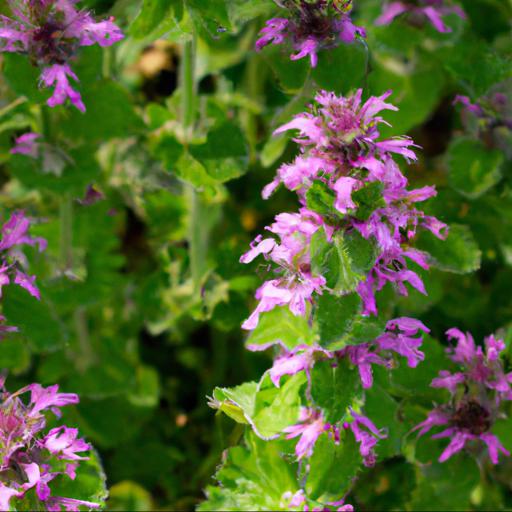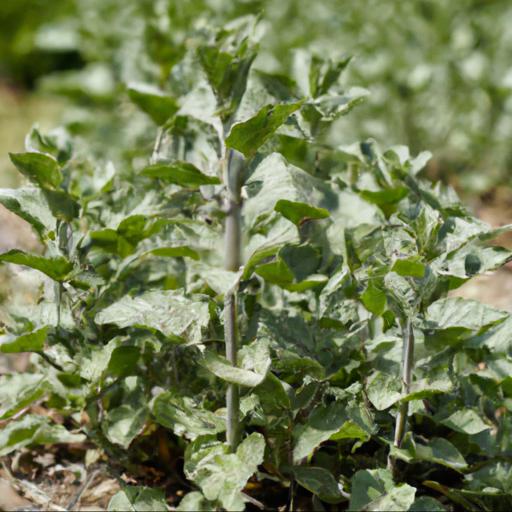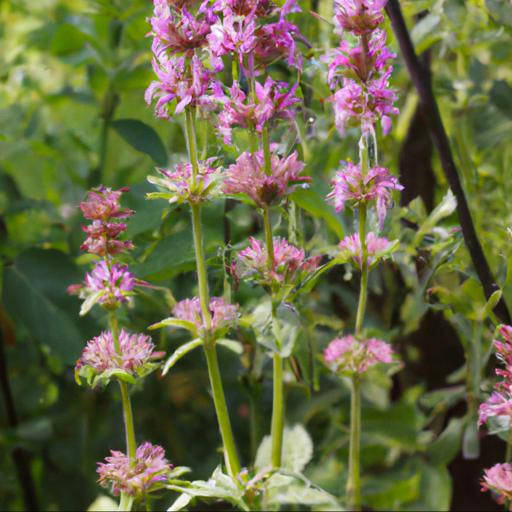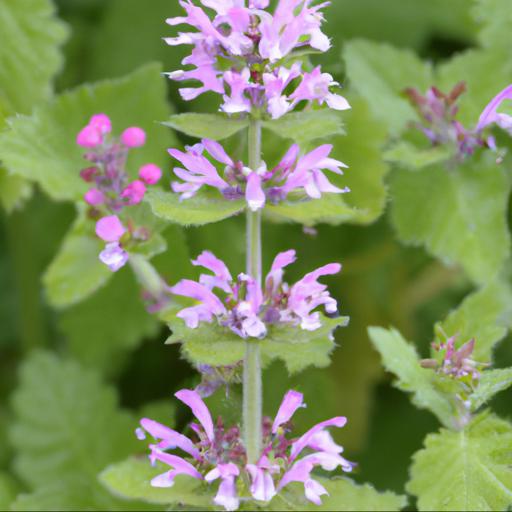Betonica officinalis, commonly known as Betony, is a traditional medicinal herb with a long history of use in Europe. It has been used to treat a variety of ailments, ranging from headaches to digestive issues and even skin problems.
Betony contains a number of active compounds that are thought to be responsible for its medicinal properties, including tannins, flavonoids, and alkaloids. Studies have shown that Betony can help to reduce inflammation, improve circulation, and even have a calming effect on the body. Betony is also known for its potential to help boost the immune system, making it a great addition to any natural health regimen.
Health benefits of betonica officinalis

Betonica officinalis, also known as wood betony, is a herbaceous plant commonly found in temperate regions of the world. It has a long history in traditional medicinal use, particularly in Europe. It boasts a wealth of health benefits, lending its use in the treatment of digestive disturbances and anxiety, among other ailments.
Betonica officinalis has been used for centuries to promote well-being, both internally and externally. Historically, it has been used to treat an array of ailments, particularly digestive disorders, such as stomach cramps and flatulence.
In addition, it is known to possess antispasmodic, diaphoretic and anti-inflammatory properties, making it a valuable remedy for allergies and asthma. Betonica officinalis is also known to help relieve anxiety, making it popular among people looking to reduce stress.
In evidence-based research, betonica officinalis has demonstrated a variety of benefits in clinical trials. It has been found to significantly reduce symptoms of anxiety in individuals, such as feelings of fear and worry. Furthermore, it has been shown to decrease the activity of isoforms of cytochrome P450, which are enzymes that are involved in the metabolism of drugs in the body.
This suggests that the herb may have defensive benefits, protecting against various drugs and toxins. Betonica officinalis has also been studied for its potential to reduce inflammation and promote healing, namely of wounds and skin conditions. This suggests that consumption of the herb may help to promote optimal skin health.
In garden settings, betonica officinalis is easy to grow and maintain. While it is considered a hardy and tolerant plant, it should not be grown in full sun, otherwise its leaves may be scorched.
It can be easily propagated by seeds or cuttings and yields purple to blue flowers in summer. Betonica officinalis is great addition to any garden and its attractive purple flower spikes are an attractive sight when planted in large quantities. Given its long history of medicinal use and its evident benefits, betonica officinalis is undoubtedly an important herb to many gardeners and herbalists alike.
How to grow betonica officinalis

It is easy to see why Betonica Officinalis is a favourite among gardeners. With its delicate purple and white flower heads, it is an eye-catching sight in any garden. Growing Betonica Officinalis is a relatively straightforward task, and with proper care, you can have a blooming flower bed each summer.
The first step in the process of growing Betonica Officinalis is to find a suitable spot in your garden. It should be in an area that receives plenty of sunlight, preferably in full sun, to ensure the best blooms.
Additionally, you should pay attention to matters of soil quality, opting for regions with high-fertility, well-drained soil. Once you have chosen your location, you can begin to prepare the soil. This should involve adding organic material, such as compost, manure, or mulch, to improve aeration and drainage for theroots.
Additionally, it is best to create a raised bed for your Betonical Officinalis to grow in, as this will boost the soil moisture levels. Once you have the soil prepared and a suitable spot chosen, it is time to plant your Betonica Officinalis.
Plant them at a distance of about 15cm apart to prevent overcrowding. Be sure to water your plants deeply when needed – about an inch per week is a good target for general care.
A small amount of fertilizer can also be used at the start of the growing season to give your Betonica Officinals a boost. In terms of maintenance, Betonica Officinalis is one of the easier blooming plants to look after. Regular deadheading will ensure that the blooms remain lush and full.
Additionally, if your plants become leggy, try cutting them back lightly and fertilizing them to help them regrow to their former glory. With a few simple steps, proper soil preparation, and regular maintenance, you can ensure healthy, vibrant blooms of Betonica Officinalis in your garden. Enjoy the colourful blooms and bask in the delicately scented flower heads this summer.
Uses of betonica officinalis

Betonica Officinalis is a traditional medicinal plant with a long history of use across Europe. Its common names of Betony and Bishop’s Wort also reflect a long history of being used as a remedy for nerve pain and aiding concentration.
With its oval serrated leaves and purple-white flowers, this species of mint is a familiar sight in UK gardens. Betonica Officinalis has a great range of uses in the garden, depending on its variety. The wild form is mainly found growing in hedgerows and pastures, while the garden form is sometimes used in borders, rockeries, and sometimes even as a ground cover.
Both forms have a sweet aroma and are useful for pollination and wild bee populations. As a medicinal plant, Betonica Officinalis has historically been used as a digestive aid and for treating headaches, nervous system complaints and menstrual pain.
The main active ingredient, betonicine, has anti-inflammatory properties, and can be found in teas, tinctures and ointments, or infused into honey or juice. In recent times it’s been added to tonic beverages, energy drinks, and herbal remedies. In addition to its medicinal uses, Betonica Officinalis can be used in the garden as a companion plant to other plants, and as a border in herbaceous borders.
As an ornamental plant, this species looks beautiful in rockeries and against walls. Its leaves are also edible, adding a nice minty taste to salads and other recipes. Overall, Betonica Officinalis is an incredibly versatile medicinal and ornamental plant for UK gardens.
Its fragrant flowers attract pollinators, and its leaves provide a great herb for both medicine and cooking. Whether enjoyed for its aesthetic contribution or its many medicinal benefits, Betonica Officinalis is a great choice for UK gardens.
Potential side effects of betonica officinalis
Betonica Officinalis is a big, bushy plant with striking blue-purple flowers commonly found in European and Asian gardens. While it’s often grown for aesthetic purposes, this wildflower has been used for centuries for its medicinal properties. While most people are familiar with the herb’s many benefits, not everyone is aware of the potential side effects that betonica officinalis ingestion can cause.
This article will explore the potential side effects of using betonica officinalis and how to avoid them. Betonica officinalis has been used to treat a variety of conditions, including colds, headaches, and digestive issues.
Additionally, it is known to have anti-inflammatory and antispasmodic properties, helping to reduce pain and muscle tension. Despite all the positive effects, overconsumption or incorrect dosage can cause some unwanted reactions. The most common side effects of betonica officinalis are gastrointestinal issues, such as abdominal discomfort, nausea, and diarrhea.
In addition, high doses of this herb may cause dizziness and blurred vision. Long-term intake of betonica officinalis may result in an increased risk of liver damage, as well as low potassium levels and an increased risk of stroke.
It is also important to note that betonica officinalis can interact with certain medications, increasing their potency and risking serious drug interactions. It is important to exercise caution when taking betonica officinalis. To avoid potential side effects, it is recommended that you seek the advice of a trained herbalist or doctor before taking this herb.
Always adhere to the recommended dosage and avoid taking more than recommended. Additionally, it is important to be aware of any personalized health risks you may have and to monitor your health while taking betonica officinalis.
Taking all these precautions can help ensure your safety and keep you healthy and happy.
Final Touch
Betonica officinalis, commonly known as common speedwell, is a medicinal herb native to Europe, Asia, and North America. It has been used for centuries to treat a variety of ailments, from respiratory problems to skin conditions.
Its healing properties are attributed to its high concentration of antioxidants, which help to reduce inflammation and boost immunity. Common speedwell is also believed to be beneficial for reducing stress and improving overall health. It can be taken as a tea or tincture, or applied topically as an ointment or oil.
FAQ
What are the medicinal properties of Betonica officinalis?
Betonica officinalis has been used medicinally for centuries and is known for its anti-inflammatory, antiseptic, astringent, and expectorant properties. It is also believed to have anti-allergic, anti-spasmodic, and sedative effects. It is used to treat respiratory problems, digestive issues, skin conditions, and headaches.
What are the traditional uses of Betonica officinalis?
The traditional uses of Betonica officinalis include treating headaches, digestive issues, and skin conditions. It has also been used as an antiseptic, to reduce inflammation, and to improve circulation.
What are the chemical constituents of Betonica officinalis?
The chemical constituents of Betonica officinalis include triterpenes, flavonoids, phenolic acids, and essential oils.
What are the potential side effects of Betonica officinalis?
The potential side effects of Betonica officinalis include nausea, vomiting, dizziness, and headaches. It may also cause allergic reactions in some people. It is important to consult a doctor before taking Betonica officinalis.
How is Betonica officinalis used in modern herbal medicine?
Betonica officinalis is used in modern herbal medicine as an anti-inflammatory, antispasmodic, and sedative. It is also used to treat headaches, anxiety, and digestive issues.
What are the potential health benefits of Betonica officinalis?
The potential health benefits of Betonica officinalis include relief from headaches, digestive issues, and respiratory problems. It is also believed to have anti-inflammatory, antioxidant, and antimicrobial properties, which may help to boost the immune system and protect against disease. Additionally, Betonica officinalis may help to reduce stress and anxiety, and improve sleep quality.

